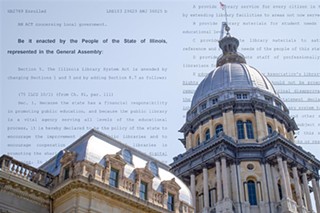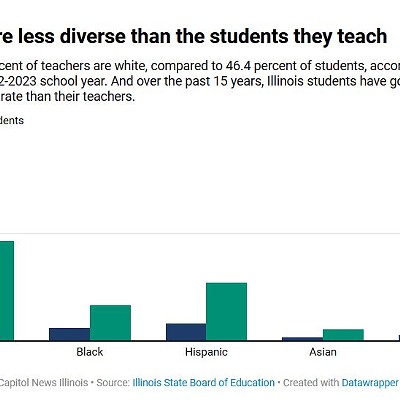More than 300 new laws took effect Jan. 1, ranging from a ban on book bans to the regulation of "deepfake porn" and prohibitions on videoconferencing while driving.
Thanks to a law signed in 2019, workers at the lowest end of the pay scale will see a pay raise with the new year as the state minimum wage increased by one dollar, to $14 per hour.
Gov. JB Pritzker championed and signed that law after it was approved by lawmakers within his first two months of office. The law gradually phases in a $15 per-hour minimum wage starting in 2025.
The minimum wage applies to most workers 18 years of age and older. Teens who work less than 650 hours in a calendar year will go up to $13 an hour while the minimum wage for tipped workers will increase to $9 an hour.
Also as of Jan. 1, Illinoisans who own guns, ammunition and accessories prohibited under the state's "assault weapons" ban will be in violation of the law if they don't register them with the state. A federal judge last week chose not to temporarily halt the law's enforcement while a broader legal challenge plays out. The U.S. Supreme Court also recently declined to stay the law.
While permanent administrative rules regulating which guns and ammunition must be registered with the Illinois State Police remain in flux, temporary rules governing registration remain in effect.
Other laws hitting the books include a measure granting paid leave to all workers, indoor vaping restrictions and a ban on youth solitary confinement in state correctional facilities, among others.
Paid leave for all
Starting Jan. 1, anyone who works in Illinois will be entitled to earn up to 40 hours of paid leave during a 12-month period, time they can take off work for any reason, regardless of whether they are full-time, part-time, or seasonal employees.
The Paid Leave for All Workers Act passed during the lame duck session in January – a session that was called primarily to pass the assault weapons ban. Pritzker signed it into law March 13.
"That is a game changer for many employers, particularly those who have not previously offered any type of paid leave to their employees," Scott Cruz, a labor attorney, said during an interview with Capitol News Illinois in November.
In particular, he said, the law will be a major change for waiters, waitresses and other workers in the hospitality industry who have never received paid leave benefits in the past.
Banning book bans
Libraries in Illinois will lose access to grants administered by the secretary of state's office after Jan. 1 if they ban books or other material "because of partisan or doctrinal disapproval."
The so-called ban on book bans was an initiative of Secretary of State Alexi Giannoulias. The secretary of state in Illinois also serves as the state librarian, which awards millions of dollars a year in grants to public and school libraries around the state.
Under the new law, libraries must either adopt the American Library Association's Library Bill of Rights or develop a written statement prohibiting the practice of banning specific books or resources.
Giannoulias said he proposed the legislation after extremist groups targeted Illinois libraries with efforts to ban certain materials from circulation.
"The concept of banning books contradicts the very essence of what our country stands for," he said in a statement. "It also defies what education is all about: teaching our children to think for themselves. This landmark law is a triumph for our democracy, a win for First Amendment Rights, and a great victory for future generations."
Digital forgeries
Lawmakers this spring approved a new protection for victims of "deepfake porn." Starting in 2024, people who are falsely depicted in sexually explicit images or videos will be able to sue the creator of that material.
The law is an amendment to the state's existing protections for victims of "revenge porn," which went into effect in 2015.
In recent years, deepfakes – images and videos that falsely depict someone – have become more sophisticated with the advent of more readily available artificial intelligence tools. Women are disproportionately the subject of deepfake porn.
Some sponsors of the legislation, notably chief sponsor Rep. Jennifer Gong-Gershowitz, D-Glenview, have indicated interest in further regulating the use of artificial intelligence.
Zooming while driving
It will now be illegal for Illinois drivers to participate in videoconferencing or check their social media pages while behind the wheel. The law adds the use of any mobile videoconferencing software, explicitly referencing Zoom, Microsoft Teams and Webex, to banned actions under existed distracted driving laws.
Illinois law currently bans cellphone use generally while driving, although it does allow drivers to use phones through hands-free or voice-activated means. In 2022, more than 24,000 drivers were cited for distracted driving in Illinois, according to the secretary of state's office.
Illinois drivers continue to be able to use cellphones in handheld mode if they are reporting an emergency, are parked on a road's shoulder or if they are stopped due to a traffic obstruction and the vehicle is in neutral or park.
Vaping indoors
People who use electronic cigarettes or vaping devices will now face the same restrictions as cigarette smokers.
It's an update to the state's Smoke-Free Illinois Act, which banned smoking in most indoor public spaces and within 15 feet of building entrances in 2008. "Public places" include restaurants, theaters, offices, stores, libraries, schools, polling places, all government-owned buildings and banks, among others.
Tobacco stores and vape shops are exempt from the law, as well as some other facilities, such as smoking rooms at nursing homes, some hotel rooms and tobacco conventions.
The U.S. Centers for Disease Control and Prevention reported this summer that in 2021, nearly 5% of adults were e-cigarette users, although that figure was 11% among people 18 to 24.
Other new laws
Youth solitary confinement: House Bill 3140 prohibits solitary confinement in youth detention facilities for any purpose other than temporarily preventing serious and immediate risk of physical harm.
Grocery initiative: Senate Bill 850 created a Grocery Initiative program which will receive $20 million to fund grants and financial aid to grocery stores opening or operating in "food deserts." It also requires the Department of Commerce and Economic Opportunity to study food deserts.
Underground Railroad task force: Senate Bill 1623 creates the Underground Railroad Task Force to develop a statewide plan for creating a "cohesive statewide history" of the Underground Railroad and developing new educational and tourism opportunities.
Utility shutoffs: House Bill 1541 prohibits utilities from shutting off gas or electric services due to nonpayment of bills when the temperature exceeds 90 degrees or there is a heat advisory in effect.
Rearview mirrors: It's long been illegal in Illinois to hang an object that obstructs a driver's view from a rearview mirror. House Bill 2389 maintains that driving with such an obstruction is prohibited, but it also prevents law enforcement from stopping and searching a vehicle solely because the driver is violating that law.
Civil rights violation: Under Senate Bill 1817, anyone who considers immigration status during a real estate transaction, including purchase and rental transactions, could be guilty of a civil rights violation.
Dangers of fentanyl: House Bill 392 requires high schools to teach students about the dangers of fentanyl in state-required health courses. The coursework would include differentiating legal and illegal uses of the drug, details about "the process of lacing fentanyl in other drugs and why drugs get laced with fentanyl," as well as information on how to detect fentanyl in drugs and how to save someone from an overdose.
Fentanyl test strips: House Bill 3203 allows pharmacists and retailers to sell fentanyl test strips over the counter.


















